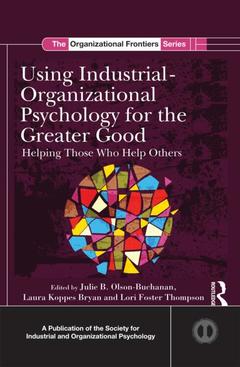Description
Using Industrial-Organizational Psychology for the Greater Good
Helping Those Who Help Others
SIOP Organizational Frontiers Series
Coordinators: Olson-Buchanan Julie B., Koppes Bryan Laura L., Thompson Lori Foster
Language: English
Subject for Using Industrial-Organizational Psychology for the...:
Keywords
corporate; social; responsibility; citizenship; behavior; humanitarian; work; triple; bottom; line; Humanitarian Work Psychology; Green Mountain Coffee Roasters; Microenterprise Development Program; Humanitarian Aid; Disaster Relief Volunteer; Vice Versa; Uncertainty Avoidance; Workplace Social Environment; LGBT Worker; Workplace Health Promotion; Industrial Organizational Psychology; Nonprofit; Nonprofit Organizations; Collective Voluntary Action; Voluntary Organizations; Emotional Exhaustion; Ceo Position; Host National; Volunteer Satisfaction; Health Risk Appraisals; Dual Salaries; Pro Mujer; Disaster Zone; Produce Field Data; Cross-cultural Training
Publication date: 03-2013
· 15.2x22.9 cm · Hardback
Publication date: 06-2014
Support: Print on demand
Description
/li>Contents
/li>Biography
/li>
Introduction Julie B. Olson-Buchanan, Laura Koppes Bryan, & Lori Foster Thompson 1.Values and Ethics of A Changing I-O Psychology: A Call to (Further) Action Joel Lefkowitz Section 1: Relevance of I-O Psychology to Societal Well-Being in the Corporate Domain 2. Going Green: Eco-I-O Psychology David E. Campbell, Laura Provolt, & J. Elliott Campbell 3.Corporate Leaders of Sustainable Organizations: Balancing Profit, Planet and People Tina Lombardo, Sherry Schneider, & Laura Koppes Bryan 4.Volunteer Programs in the Corporate World Jaime Henning & David Jones 5.Corporate Philanthropy and the Role of Industrial-Organizational Psychology Sara Weiner 6. Building an Inclusive Work World: Promoting Diversity and Positive Inter-Group Relations Through CSR. Jill Bradley-Geist & Eden King 7. The "We" in Wellness: Workplace Health Promotion as a Positive Force for Health in Society Joel B. Bennett & Lois E. Tetrick Section 2: I-O Psychology in the Nonprofit Domain. 8. Recruitment, Retention, and Motivation of Volunteers in the Nonprofit Sector: A Volunteer Socialization Perspective Erika Carello Lopina & Steven G. Rogelberg 9. Salient Challenges of Staffing and Managing Employees in the Non-Profit Sector James M. Schmidtke & Anne Cummings 10. Non-Profit Leadership and Governance Rick Jacobs & Johanna Johnson 11. I-O Psychology Education and the Nonprofit Context Kecia Thomas, Stephanie Downey & Kerrin George Section 3: Nontraditional Domains: I-O Psychology Without Borders 12. I-O Psychology Without Borders: The Emergence of Humanitarian Work Psychology Alexander Gloss & Lori Foster Thompson 13. Entrepreneurship and Poverty Reduction: Applying I-O Psychology to Microbusiness and Entrepreneurship in Developing Countries Michael M. Gielnik & Michael Frese 14. Assessing and Placing Disaster Relief Volunteers C. Harry Hui, Xiaohua Zhou, M. P. Sally Chan, Xiao Zhang & Jinyan Fan 15. Using I-O Psychology to Improve the Plight of Women in Developing Countries: A Research Agenda Virginia E. Schein 16. Aiding International Development: Some Fresh Perspectives from Industrial and Organizational Psychology Stuart C. Carr, Shahla Eltayeb, Malcolm MacLachlan, Leo Marai, Eilish McAuliffe, & Ishbel McWha 17. Mobilizing Action Through Professional Societies Tracey E. Rizzuto & Vicki V. Vandaveer Commentary Adrienne Colella Commentary Homo Economicus, Industrial Psychology, and the Greater Good Milton Hakel Commentary Kurt Kraiger Commentary Answering the Call: Advancing a Prosocial Organizational Psychology Douglas H. Reynolds
Julie Olson-Buchanan is a professor and department chair in the Department of Management at the Craig School of Business at California State University, Fresno. Dr. Olson-Buchanan’s research interests include conflict and mistreatment in organizations, technology-based selection, work-life issues, virtual teams, and nonprofit engagement.
Laura Koppes Bryan is Dean of the Yale Gordon College of Arts and Sciences, University of Baltimore. Previously, she was Director and Professor, School of Psychological and Behavioral Sciences, University of West Florida (UWF), and Director of the UWF Center for Applied Psychology.
Lori Foster Thompson is a professor of psychology at North Carolina State University, where she oversees the IOTech4D lab devoted to research at the intersection of work, psychology, technology, and global development.




